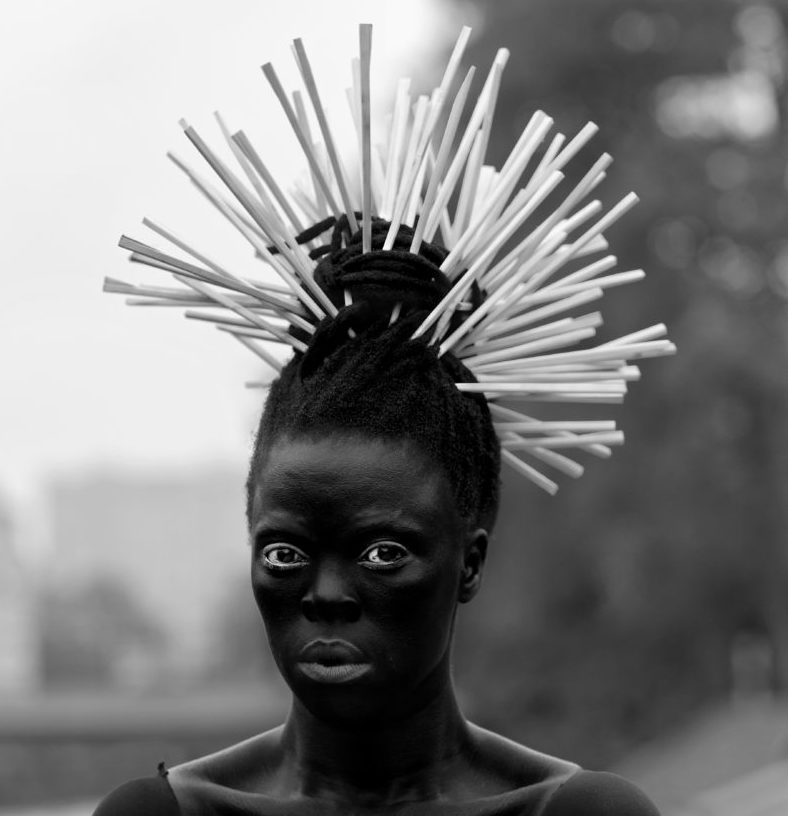On a balmy Johannesburg morning, we meet South African photographer and activist Zanele Muholi at the Stevenson Studios in Braamfontein, a colorful cultural hub north of the city. Here, we are surrounded by her collection of self-portraits. Everywhere you look is Muholi, each image stark in mood and meaning.
You turn to the real Muholi – the award-winning photographer known for her work exploring gender, race and sexuality – in flesh and blood, lost in thought, just like her portraits.
Incidentally, blood has been a prevailing topic in some of Muholi’s works.
For her collection, Visual Sexuality: Only Half the Picture, she photographed herself in front of the mirror, portraying her first experience of puberty, trying to figure out what it meant to be a woman. Understandably, it was a difficult shoot.
“It was perceived as taboo to talk about periods, whereas people could easily speak about rape and other issues affecting women,” says Muholi.
“Before I am anything in the world, I am a woman.”
The last of five children, Muholi, 43, was only a few months old when her father died. Born and schooled in Durban in the South African province of KwaZulu-Natal, those initial years were difficult.
Muholi earned her first salary at a factory producing linen in KwaZulu-Natal. Destiny tempted her in the form of a camera. She left the factory job hoping to bus it to the city of Johannesburg to study film and videography at the Film and Allied Workers Organization.

Somnyama-Ngonyama-II
Unfortunately, her interview was unsuccessful and she wasn’t admitted to the program.
She ended up braiding hair at her tiny flat in Century Plaza, Johannesburg, to make ends meet. She realized she was quite creative at it.
But braid after braid, she was getting closer to her dream.
In 2003, she completed an Advanced Photography course at the famed Market Photo Workshop in Newtown, Johannesburg, only three kilometers from the Stevenson Studios, where she now displays her self-portraits. In Newtown, she held a camera for the first time.
“I have always wanted to tell human stories like lesbian, gay, bisexual, transgender and intersex [stories]. I noticed there was a lack of visual material that spoke to our needs and I wanted to capture that,” says Muholi.
In 2009, she completed a Master of Fine Arts degree in documentary media at Ryerson University in Toronto.
One of her portraits, Hlengiwe (pictured below) is a tell-all on hate crime and discrimination.
“It refers to the number of cases that I have heard, especially from hate crime victims and survivors who didn’t have the courage to report it to the police because they were going to lose it [the case] anyway. As much as it’s a beautiful image, it’s one of those painful and exhausting stories,” says Muholi.
Passionate about “visual history” and women, Muholi says photography is her life. And she has always wondered why there were few female photographers – especially in history.
“There were so many historic moments and stories around us, but I didn’t see any woman capturing those` moments… I asked myself why women are not drawn to this career. If we could have female bus drivers, why would it be difficult for women to carry cameras? I mean a camera is not too heavy,” says Muholi.
In 2012, she faced a serious setback in her career when intruders broke into her flat in Cape Town and made off with her hard drives containing five years of unpublished photographic work. She believes it was sabotage.

Somnyama-I-Paris-2
“Those people knew what they were doing, they’re were trying to slow me down,” she says.
Calling herself the first black lesbian to tell her life stories through a series of black and white self- portraits, the highlight of her career she says was displaying these portraits at a solo exhibition in Brooklyn, New York, in 2015.
“I felt I had arrived, I couldn’t slow down and that only death would stop me from doing what I love,” she says.
“One thing that people don’t know about me, I cry a lot and get really frustrated when I cannot be creative. So, I guess photography makes me happy.”
Currently busy with a new collection of photographs, Somnyama Ngonyama, meaning ‘hail, the dark lioness’, she has four published books and hopes to have at least 10 publications under her belt by 2020. And she wants to leave a legacy, like some of South Africa’s icons.
“I want to leave a mark just like the legendary Brenda Fassie and Miriam Makeba did with their music,” she says.
Life taught her resilience. Photography taught her about connecting. With the world. And herself.
